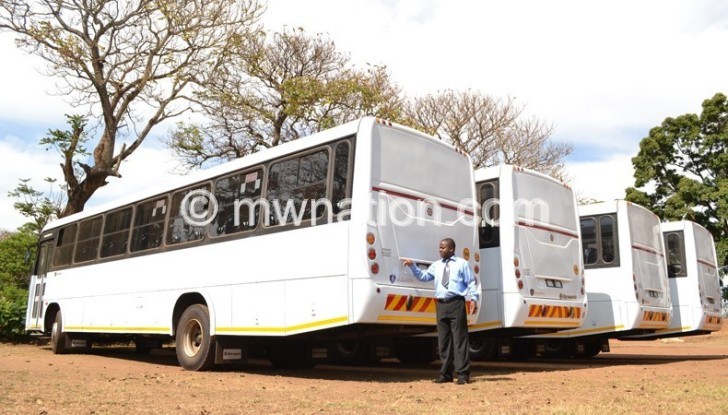Government risks losing billions of kwacha in depreciation and management costs for delaying to dispose of property it seized from Cashgate convicts eight years ago.
But Attorney General Thabo Chakaka-Nyirenda and Director of Public Prosecutions Steven Kayuni have defended the delay.
Cashgate buses that government confiscated and later
distributed to some public institutions
The fears follow government’s withdrawal from sale of Cashgate properties it put up for auction early this early.
The properties include a house belonging to former Ministry of Tourism principal secretary Tressa Senzani (now deceased)—following her conviction on the charge of theft and laundering of K65 million. She offered her house in Lilongwe’s Area 47, worth K340 million, as compensation for the funds she stole.
Other property belonged to Oswald Lutepo, a private businessperson who was convicted on a charge of theft and money laundering of K3.1 billion. His restituted company called Woget Industries and Cotton Ginnery located at Matindi along the M1 in Blantyre, valued at K600 million.
Documents from investigating agencies show that the State recovered K63 million from Senzani and a vehicle from convict Victor Sithole. The State also recovered a vehicle valued at K7 million and K18 million cash from suspects Luke Kasamba and the late Maxwell Namata.
The State also applied for confiscation of K112 400 000, $31 850, 122 200 South African rand, a Toyota Vits, K750 000, K1 400 000 and a house on plot number 25/LC/87 and Whispers Bar at Area 25 belonging to Sithole.
Further, the State applied for confiscation of properties belonging to Wyson Zinyemba Soko, who allegedly stole K40 million. The targeted properties included a Mercedes Benz and a Toyota Fortuner.
Renowned estate valuer Yeremiah Chihana, in an interview on Tuesday, pointed out that the seized property may also be prone to vandalism, and urged government to speed up the process.
According to Chihana, the Department of Estate Management in the Ministry of Lands or Department of Housing ought to have been tasked to take charge of some of the properties and rent them out while awaiting disposal.
He said: “Government ought to have assigned the assets to a property professional at the point of seizure but most properties were seized and kept idle which is wrong.
“While some properties and assets may still have value, with plant and machinery there is high depreciation value and a loss is likely.”
Legal Affairs Committee of Parliament chairperson Peter Dimba urged the authorities to fast track the disposal process, especially for cases which were already concluded in the courts.
Said Dimba: “We urge all relevant stakeholders to hasten the conclusion of cases so that the seized or forfeited assets can be dealt with in accordance with the law.”
But in an interview this week, while confirming the withdrawal from sale, the AG said government could not sell the properties at below market value.
He explained that government wants to first do a re-evaluation to come up with minimum market value for the properties adding that public auction may not be the best option to get value for money.
Said Chakaka-Nyirenda: “Some of the items such as vehicles may have depreciated, but real estate property has gained value.”
On his part, Kayuni stressed that there is no short cut in disposing of the properties and that public finance management and disposal laws will have to be followed to the letter.
The DPP added that his office and other law enforcement agencies are only a part in the machinery process, but that the custodian of such property is Secretary to Treasury.
Said Kayuni: “The process is in motion, patience would help attain desired value for money that Malawians would cherish.”
About 60 percent of Cashgate cases had been completed by 2020, records show.
The records also show that by November 2015, there were 124 Cashgate cases before the special Cashgate prosecutor Kamudoni Nyasulu, the DPP and the Anti-Corruption Bureau—the main prosecuting agencies.
In total, 94 suspects entered trial with 40 being convicted and trials for 19 suspects were close to finalisation, representing a near-completion rate of 64 percent.
The suspects investigated and convicted included 36 public officers from 10 government ministries, departments and agencies as well as 122 private sector companies, including three legal firms.
The shooting of former Ministry of Finance budget director Paul Mphwiyo outside the gate of his Area 43 residence in Lilongwe on the night of September 13 2013 led to revelations of the plunder of public resources at Capital Hill that later came to be known as Cashgate.
The High Court in 2020 found Mphwiyo and 17 others with a case to answer in connection with alleged theft and money laundering of K2.4 billion in public funds.
Former president Joyce Banda ordered an audit which British forensic auditor, Baker Tilly, undertook covering the period between April and September 2013.
The audit established that about K24 billion was siphoned from public coffers through dubious payments, inflated invoices and goods or services never rendered.
A financial analysis report by audit and business advisory firm PricewaterhouseCoopers (PwC) also established that about K577 billion in public funds could not be reconciliated between 2009 and December 31 2014.
The post Cashgate properties still idle eight years on appeared first on The Nation Online.
 Moni Malawi
Moni Malawi 

